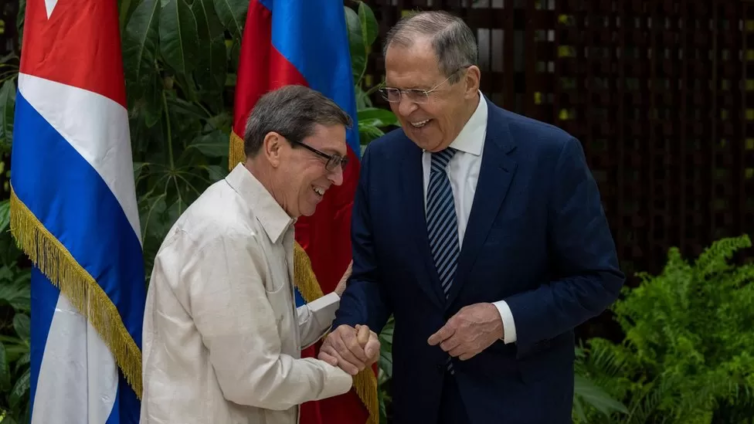
Audio By Carbonatix
The Cuban foreign ministry says it has uncovered a human trafficking ring aimed at recruiting Cubans to fight for Russia in its war in Ukraine.
It said that Cubans living in Russia and "even some in Cuba" had been "incorporated into the military forces taking part in the war in Ukraine".
Cuba is a close ally of Russia, but it stressed in its statement "it does not form part of the conflict in Ukraine".
There has not yet been a response from Russia.
The Cuban foreign ministry did not specify who was behind the operation.
Last August, President Vladimir Putin ordered the Russian military to increase its number of soldiers after its combat forces suffered heavy losses in Ukraine.
A Russian newspaper, Ryazan Gazette, has since reported that Cubans living in Russia had joined Russian combat forces fighting in Ukraine in exchange for a promise to receive Russian citizenship.
While it is not clear if the Cuban foreign ministry statement is linked to the reports in Ryazan Gazette, it states that "Cuba has a firm and clear historical position against the use of mercenaries".
"We will act decisively against those who... engage in human trafficking with the aim of recruiting Cuban citizens to bear arms in any country," the statement reads.
Cuban Foreign Minister Bruno Rodríguez published the statement on X, formerly known as Twitter, adding that Cuba was using "the force of the law" to counter attempts to recruit its citizens.
The statement strikes a rare dissonant note in recent Cuban-Russian relations, which has seen the two countries forging tighter trade ties.
Just over two months ago, the defence ministers of Cuba and Russia held talks in Moscow, and the Russian foreign minister travelled to the Communist-run island in April as part of a tour of Russia's Latin American allies.
Cuba has been a close ally of Russia since the Cuban revolution, which saw Fidel Castro seize power in 1959.
Castro - whom the United States tried and failed to overthrow on numerous occasions - sided with Russia in the Cold War. Moscow in turn provided the government in Havana with economic, political and military assistance.
A secret deal in 1962 allowing the Soviet Union to station nuclear missiles in Cuba to deter fresh US attempts to invade the island triggered one of the Cold War's most dangerous confrontations between the US and the Soviet Union.
While the Cuban missile crisis came to an end peacefully after Soviet leader Nikita Khrushchev and US President John F. Kennedy reached an agreement, Cuba's relations with the US have remain tense, not least due to the decades-long sanctions the US has imposed on Cuba.
Latest Stories
-
Cedi under seasonal pressure as Q1 demand intensifies; one dollar equals GH¢11.80 at forex bureaus
4 minutes -
Roads Minister rejects Minority’s claim of downgrading Suame Interchange Project
15 minutes -
Eco-Africa Network demands dismissal of culpable officials in explosive JoyNews exposé
23 minutes -
Ayawaso East vote-buying: Party will take decision after committee findings – NDC
24 minutes -
Ayawaso Zongo Chiefs warn of possible chaos if NDC annuls disputed primary
44 minutes -
I didn’t see failure as an option: Chicago Fire forward Shokalook
52 minutes -
TI-Ghana condemns alleged vote-buying in Ayawaso East NDC primary
59 minutes -
Karim Zito resigns as Asante Kotoko head coach following MTN FA Cup elimination
1 hour -
“Is your cell phone bugged?” Why privacy may be an Illusion in the age of smart devices
2 hours -
Politicians will soon distribute Range Rovers – Dr Asah-Asante warns over vote-buying
2 hours -
MIIF’s Economic and Market Outlook for 2026 forecasts increased investment in AI
2 hours -
GIADEC CEO clarifies land dispute, outlines aluminium industrial park plans
2 hours -
Mahama amuses surgeons with humorous take on childbirth at regional conference
2 hours -
Ex-occultist Ama Born Again warns of bloody and dangerous rituals at marketplaces
3 hours -
Painful memories, hard lessons: Why Ghana’s backroom team matters more than ever
3 hours

